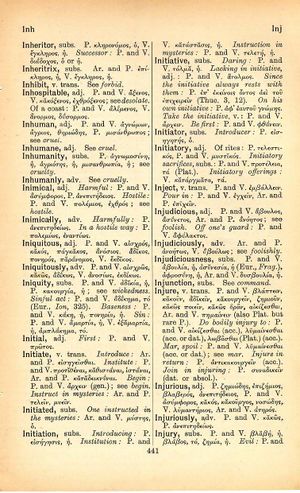initiator: Difference between revisions
From LSJ
τοῖς πράγμασιν γὰρ οὐχὶ θυμοῦσθαι χρεών· μέλει γὰρ αὐτοῖς οὐδέν· ἀλλ' οὑντυγχάνων τὰ πράγματ' ὀρθῶς ἂν τιθῇ, πράξει καλῶς → It does no good to rage at circumstance; events will take their course with no regard for us. But he who makes the best of those events he lights upon will not fare ill.
(3_7) |
m (Text replacement - "}}]]" to "}}]]") |
||
| Line 1: | Line 1: | ||
{{Woodhouse1 | {{Woodhouse1 | ||
|Text=[[File:woodhouse_441.jpg|thumb | |Text=[[File:woodhouse_441.jpg|thumb | ||
|link={{filepath:woodhouse_441.jpg | |link={{filepath:woodhouse_441.jpg}}]]'''subs.''' | ||
<b class="b2">Introducer</b>: P. [[εἰσηγητής]], ὁ. | <b class="b2">Introducer</b>: P. [[εἰσηγητής]], ὁ. | ||
}} | }} | ||
Revision as of 10:08, 15 August 2017
English > Greek (Woodhouse)
subs.
Introducer: P. εἰσηγητής, ὁ.
Latin > English (Lewis & Short)
ĭnĭtĭātor: ōris, m. id.,
I an originator, founder (late Lat.): novi testamenti, Tert. adv. Marc. 4, 14.
Latin > French (Gaffiot 2016)
ĭnĭtĭātŏr, ōris, m. (initio), initiateur : Tert. Marc. 4, 14.
Latin > German (Georges)
initiātor, ōris, m. (initio), I) der Beginner (Ggstz. consummator), Tert. adv. Marc. 4, 22. – II) der Einweiher in usw. mysteriorum dei, Hieron. Didym. de spir. scto 50.

